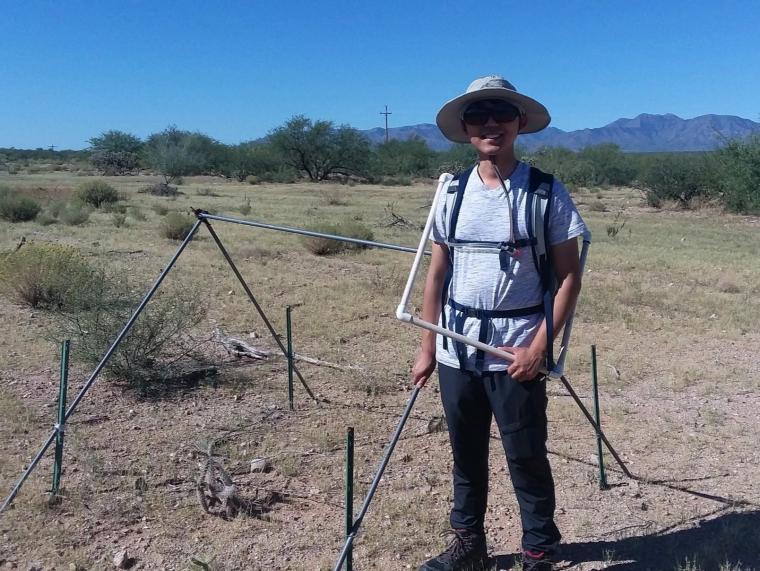Ben Yang, Fall '21 Outstanding Graduate Student

Ben Yang
Tell us a little about yourself.
I originally come from China. I earned my Bachelor of Environmental Biology from the University of Toronto. I spent four years in Toronto and now here, five more, to continue my PhD work in soil microorganisms and restoration.
The reason I choose environmental science is not a straight forward story. I was originally interested mostly in plants. I’m a nature lover, since young. My grandmother is a typical Chinese woman who grew veggies around our apartment. She didn’t even have land to grow plants. Only having pods and random containers filled with soil and growing pepper. When I was young, I was interested in growing things. Now, I’m living in a house around campus, and I grow veggies in my backyard too. Last month, I brought my backyard grown melon to our lab meeting.
Also, I went to a middle and high school up in a mountain. The biodiversity there is crazy high. When we're studying in the night there are insects hitting our windows. At that time, I start to be impressed by biodiversity. I have a huge interest in plants, insects, birds, and fish. Plus, that’s the time I started taking photographs.
I choose microbiology because I want to do something more practical and more cutting edge. And restoration because I like practical stuff. I love nature and I want to heal it. When I was in the mountain, I could see the landscape change around me and the heavy air pollution in China. That doesn't look so good. I feel like I have a responsibility to let, at least my son, see beautiful nature as much as I did. So, I need to do something to slow down the degradation of the natural ecosystem.
What do you research and why?
Our lab is a microbiology lab and we're relying on sequencing technologies to get a big blueprint about the soil microbial communities. Most of my colleagues are doing bioinformatics because sequencing generates a lot of data about microbes, and much of this data is probably not so meaningful, so their job is to select and see the key patterns. I'm more focused on the application side. Many of my projects are going to the restoration site, taking soil samples, and sequencing the samples to see how microbial communities change during the restoration.
In the future, you will be able to use microbial communities as indicators for restoration, such as biodiversity, richness, composition, and functional groups. Maybe we can identify important microbial species that are related to the success of restoration. We can then use those microbes as an inoculant to improve our restoration outcome. This is especially important in drylands, because nutrients are so limited, and microbes are so important and nutrient recycling.

What do you teach and what do you enjoy the most about it?
I teach Environmental Microbiology (ENVS 525), so it is very relevant to my work. I'm enjoying sharing what I learned from my research with the students to make learning more practical. In high school, I would question why I would have to study these subjects I didn’t think I would use in the future. But when students are asking, “So what's the point of doing these techniques, and why are we learning this?” I can tell them, “Because in real research, if you don’t do this, it will fail, and you will waste a lot of money.”
When I started this position, I felt I was communicating with the students when I graded their quizzes. I'm very much enjoying leaving feedback. I like to use humor to encourage students and connect with them. I learned how to teach at a museum. I’m a volunteer museum instructor at the Royal Ontario Museum in Canada. I worked in Schad Gallery of biodiversity and when I faced the visitors, like children and parents, you could see the sparkle of curiosity in their eyes. I like interacting with students and seeing them learn something. It is also important for me, because you don’t really know how much you understand a concept, until you can tell someone else about it.
Future plans?
I don’t really have a long-term future plan. I just want to do a good project, get good publications, do an awesome PhD dissertation, and graduate. I am not limiting my future. I can stay in academia since I like to teach, I can become a lecturer. But, when I recently visited my collaborator in California, I felt like being a park ecologist would be an awesome thing. You can take pictures, make information broad, and drive around the park. I like telling stories, writing, and speaking so maybe doing something in general education to teach people would be good as well.
Words of advice?
Be passionate about everything and stay curious about this world. Don't limit yourself. Your future and what you do should be boundless. Do the things you like to do. There's not a thing in people's lives you have to do at a specific age. Stay curious, be passionate, and don’t limit yourself.
